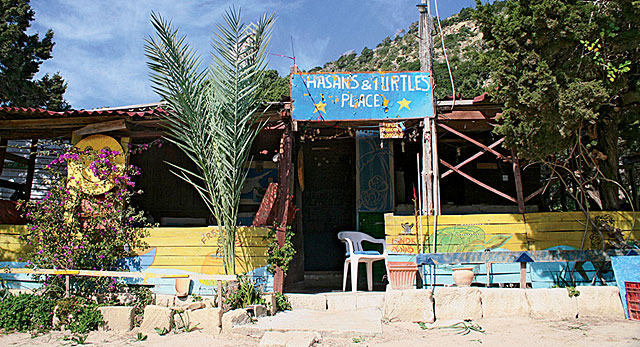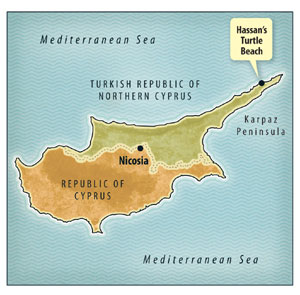sierraclub.org - sierra magazine - july/august 2011 - escape

Helen Puckey
Karpaz Peninsula, Turkish Republic of Northern Cyprus
$41 per night for a two-person bungalow (includes breakfast); $7-$14 per night per person for a tent
hassansturtlebeach.com
Fly to Larnaca International Airport in Cyprus. Take a taxi to Nicosia; cross over into the Turkish Republic of Northern Cyprus. Rent a car and drive 90 miles on unpaved byways onto the Karpaz Peninsula. Brake for fresh fruit and wild donkeys.
Late-night beach trek to spot newly hatched turtles. We never saw any, but the endlessly star-speckled sky and Hassan's stories about the region's history made up for it.
Realizing my nice golden tan was actually a fierce sunburn, then spending the rest of the evening covered in aloe, struggling to make small talk with fellow campers. Pain relief came in the form of zivania (a traditional local liquor) straight from the flask.
Resort owner, former marine biologist, and local legend Hassan Korkmaz. His two priorities: protecting green and loggerhead turtles and feeding you his homemade souvlaki and kleftiko (slow-roasted lamb). He keeps his cell phone in a basket under a tree—the only spot on the property that gets reception, albeit intermittently. Ask for Hassan's famous "air-conditioned" suite: a bungalow whose screens let in the sea breeze.
 Map by Peter and Maria Hoey
Map by Peter and Maria Hoey
Donkeys roam beaches, trample crops, and startle unsuspecting drivers. They're cute. They're a nuisance. And they're there, in part, because Greek Cypriot farmers had to abandon the animals' forebearers when Turkey invaded in 1974. So mostly, they're a sad reminder of the island's violent past and ongoing ethnic divisions.
The peninsula is a wildlife reserve for endangered sea turtles. The hatchlings instinctively head toward light, and if that's the neon glow of a local bar, it could mean death. Conservationists, including Hassan, guide the tiny stragglers safely to sea. Local laws forbid beach bonfires and speedboats after 10 p.m. And the resort's superbasic accommodations also minimize its footprint.
Hassan wants to protect the turtles, but he also wants a thriving business. And since more tourism means more development, and more development means fewer turtles, Hassan's Turtle Beach is part of the problem.
At the Marine Turtle Conservation Project, volunteers work with researchers who study and protect turtles throughout Northern Cyprus. Prepare to pay for a six-week commitment, less-than-stellar sleeping arrangements, a long, hard battle with mosquitoes, and the unforgiving Mediterranean sun.
—Tania Khadder